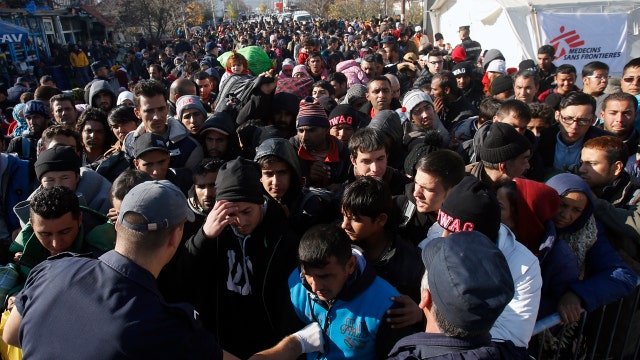As Congress and America's governors debate whether to allow in more Syrian refugees, more than 2,000 already have been admitted since the start of the 2011 Syrian civil war.
A spotlight may now be put on the status of those refugees, and the process for vetting them, as lawmakers and governors raise security concerns in the wake of the Paris terror attacks. House Speaker Paul Ryan called Tuesday for a "pause" in Syrian refugees coming to the U.S., and assembled a task force to bring legislation to a vote as soon as this week.
"This is a moment where it's better to be safe than to be sorry," Ryan said.
As it stands, a handful of states have absorbed the bulk of the Syrian refugee population: California, Texas, Michigan, Arizona and Illinois.
Of those states, governors in all but California have declared they will try to stop Syrian refugees from settling in their states going forward -- though the federal government, under a 1980 law, has the ability to admit and resettle refugees using federal funds, while taking state input under consideration.
Together, just those five states already have accepted hundreds.
According to the State Department's Refugee Processing Center, since January 2012, California has received 251 Syrian refugees; Texas has received 242; Michigan has received 206; Arizona has received 168; and Illinois has received 157.
At the same time, some other states have received none at all this year, including Alabama, Maine, Iowa and New Mexico.
The process for taking in refugees can be extensive. As of September, a State Department official estimated it takes between 18 and 24 months to process such an application.
Before a refugee can even be vetted, he or she first needs to be declared eligible -- a decision typically made by the U.N. High Commissioner for Refugees. The U.N. high commissioner has an office in Damascus; if the office recommends resettlement, the application is processed at one of nine Resettlement Support Centers around the world.
From there, a refugee would have to undergo a security clearance check, an in-person interview, a medical screening and other steps.
According to officials, this process involves several agencies including the Department of Homeland Security and National Counterterrorism Center.
All this is done before a refugee can set foot on American soil.
The in-person interviews are conducted by U.S. officers who travel to where the refugees are located to speak to them. According to one State Department official, as of September there was a team of 17 people conducting interviews of Syrians and others in Istanbul.
After the vetting is conducted overseas, the refugees come into the U.S. at different, pre-determined points of entry. The State Department works with other agencies to determine where to resettle a refugee.
Citing this existing process, Obama administration officials this week have defended the plan to bring 10,000 more Syrian refugees into the U.S. over the next year.
But congressional lawmakers and governors want the administration to at least pause the program to make sure the vetting process is as tight as possible.
"We need to make sure that every person stepping onto American soil is exactly who he says he is, and right now we don't have the necessary verification safeguards in place to make that determination, not by a long shot," Sen. David Vitter, R-La., said in a statement on Tuesday, introducing legislation to stop the admission of Syrian refugees until additional safeguards are in place.
The debate has escalated into a war of words at the federal and state level. President Obama on Monday scolded lawmakers who would call for a religious test for refugee applicants.
And after New Jersey Gov. Chris Christie announced his opposition to admitting Syrian refugees -- even orphaned children -- New Jersey Assembly Speaker Vincent Prieto, a Democrat, said the governor has forgotten America's ideals.
"We absolutely must have a thorough screening and vetting process for all refugees, but we also must be better than the governor's xenophobia. We especially shouldn't be targeting orphaned preschoolers, toddlers and babies, lest we see more drowned bodies washing ashore," Prieto said in a statement. "Orphaned children pose no threat to our nation."
The Associated Press contributed to this report.

























